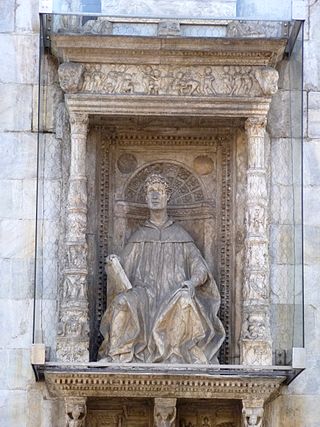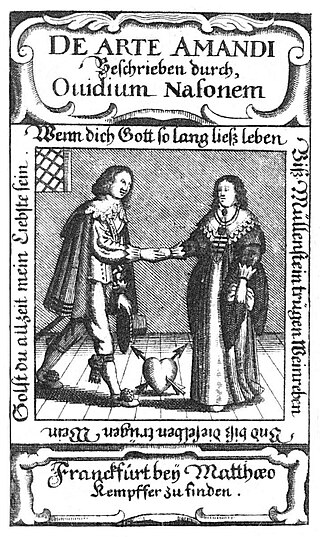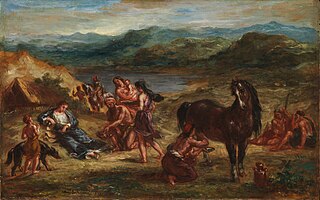Related Research Articles

Ares is the Greek god of war and courage. He is one of the Twelve Olympians,and the son of Zeus and Hera. The Greeks were ambivalent towards him. He embodies the physical valor necessary for success in war but can also personify sheer brutality and bloodlust,in contrast to his sister,the armored Athena,whose martial functions include military strategy and generalship. An association with Ares endows places,objects,and other deities with a savage,dangerous,or militarized quality.

In ancient Greek religion and Greek mythology,Pasiphaë was a queen of Crete,and was often referred to as goddess of witchcraft and sorcery. The daughter of Helios and the Oceanid nymph Perse,Pasiphaëis notable as the mother of the Minotaur. She conceived the Minotaur after mating with the Cretan Bull while hidden within a hollow cow that the Athenian inventor Daedalus built for her,after Poseidon cursed her to fall in love with the bull,due to her husband,Minos,failing to sacrifice the bull to Poseidon as he had promised.

Publius Ovidius Naso,known in English as Ovid,was a Roman poet who lived during the reign of Augustus. He was a contemporary of the older Virgil and Horace,with whom he is often ranked as one of the three canonical poets of Latin literature. The Imperial scholar Quintilian considered him the last of the Latin love elegists. Although Ovid enjoyed enormous popularity during his lifetime,the emperor Augustus banished him to Tomis,a Dacian province on the Black Sea,where he remained a decade until his death.

Arachne is the protagonist of a tale in Greek mythology known primarily from the version told by the Roman poet Ovid (43 BCE–17 CE),which is the earliest extant source for the story. In Book Six of his epic poem Metamorphoses,Ovid recounts how the talented mortal Arachne,daughter of Idmon,challenged Minerva,goddess of wisdom and crafts,to a weaving contest. When Minerva could find no flaws in the tapestry Arachne had woven for the contest,the goddess became enraged and beat the girl with her shuttle. After Arachne hanged herself out of shame,she was transformed into a spider. The myth both provides an aetiology of spiders' web-spinning abilities and was a cautionary tale about hubris.

Gaius Plinius Caecilius Secundus,born Gaius Caecilius or Gaius Caecilius Cilo,better known as Pliny the Younger,was a lawyer,author,and magistrate of Ancient Rome. Pliny's uncle,Pliny the Elder,helped raise and educate him.

The Ars amatoria is an instructional elegy series in three books by the ancient Roman poet Ovid. It was written in 2 AD.
Amores is Ovid's first completed book of poetry,written in elegiac couplets. It was first published in 16 BC in five books,but Ovid,by his own account,later edited it down into the three-book edition that survives today. The book follows the popular model of the erotic elegy,as made famous by figures such as Tibullus or Propertius,but is often subversive and humorous with these tropes,exaggerating common motifs and devices to the point of absurdity.

Martin Litchfield West,was a British philologist and classical scholar. In recognition of his contribution to scholarship,he was awarded the Order of Merit in 2014.

Levitha,known in classical antiquity as Lebinthus or Lebinthos is a small Greek island located in the east of the Aegean Sea,between Kinaros and Kalymnos,part of the Dodecanese islands. It is part of the municipality of Leros. The island is mentioned in two of Ovid's works Ars Amatoria and the Metamorphoses in connection with the saga of Daedalus and Icarus. While escaping from Crete,Daedalus and Icarus flew over Lebinthus. Besides Ovid,the island is noted by the ancient authors Pliny the Elder,Pomponius Mela,Strabo,and Stephanus of Byzantium. In addition,it is mentioned in the Stadiasmus Maris Magni.
Adrian Swayne Hollis was an English classical scholar and correspondence chess grandmaster,the title having been awarded in 1976.
Elaine Fantham was a British-Canadian classicist whose expertise lay particularly in Latin literature,especially comedy,epic poetry and rhetoric,and in the social history of Roman women. Much of her work was concerned with the intersection of literature and Greek and Roman history. She spoke fluent Italian,German and French and presented lectures and conference papers around the world—including in Germany,Italy,the Netherlands,Norway,Argentina,and Australia.

Sir Roger Aubrey Baskerville Mynors was an English classicist and medievalist who held the senior chairs of Latin at the universities of Oxford and Cambridge. A textual critic,he was an expert in the study of manuscripts and their role in the reconstruction of classical texts.

Medicamina Faciei Femineae is a didactic poem written in elegiac couplets by the Roman poet Ovid. In the hundred extant verses,Ovid defends the use of cosmetics by Roman women and provides five recipes for facial treatments. Other writers at the time condemned women's usage of cosmetics.

In Greek and Roman mythology,Aura is a minor deity,whose name means "breeze". The plural form,Aurae is sometimes found. According to Nonnus,Aura was the daughter of the Titan Lelantos and the mother,by Dionysus,of Iacchus,a minor deity connected with the Eleusinian mysteries,while Quintus Smyrnaeus makes the Aurae daughters of Boreas,the North-wind. Aurae was the title of a play by the Athenian comic poet Metagenes,who was contemporary with Aristophanes,Phrynichus,and Plato.

Ovid,the Latin poet of the Roman Empire,was banished in 8 AD from Rome to Tomis by decree of the emperor Augustus. The reasons for his banishment are uncertain. Ovid's exile is related by the poet himself,and also in brief references to the event by Pliny the Elder and Statius. At the time,Tomis was a remote town on the edge of the civilized world;it was loosely under the authority of the Kingdom of Thrace,and was superficially Hellenized. According to Ovid,none of its citizens spoke Latin,which as an educated Roman,he found trying. Ovid wrote that the cause of his exile was carmen et error,probably the Ars Amatoria and a personal indiscretion or mistake. The council of the city of Rome revoked his exile in December 2017,some 2000 years after his banishment.
Alison Ruth Sharrock is an English Classics scholar. She has been Professor of Classics at the University of Manchester since August 2000. In 2009,she gave the Stanford Memorial Lectures. Together with David Konstan of Brown University,she edits the series Oxford Studies in Classical Literature and Gender Theory published by Oxford University Press.
Rhiannon Ash is a British classical scholar specialising in Latin literature and Tacitus. She is professor of Roman Historiography in the Faculty of Classics,University of Oxford,and a Fellow of Merton College,Oxford. She was formerly a lecturer at the Department of Greek and Latin at University College,London.

Jennifer Ingleheart is a British classical scholar,who is known for her work on Ovid,Classical reception,and the influence of Rome on the modern understanding of homosexuality. She is Professor of Latin at the University of Durham.

Gaius Furius Chresimus,or Cresimus,or Cressinus,was a 2nd-century BC Greek farmer and freedman in the Roman Republic mentioned in a fragment of the lost history of Lucius Calpurnius Piso Frugi,preserved in Pliny's Natural History. Piso tells that Furius Chresimus was acquitted of accusations of witchcraft during the aedileship of Spurius Postumius Albinus,dated 191 BC. The trial took place in a period of reaction against the growing influence of Hellenism at Rome,notably led by Albinus. Both Piso and Pliny told the story of the trial for its moralizing aspect.
Jinyu Liu (刘津瑜) is Professor of Classics at DePauw University and Distinguished Guest Professor at Shanghai Normal University ). She is an expert in Roman history,social history,translation,the reception of Graeco-Roman classics in China,and Latin epigraphy.
References
- ↑ "CA Governance". classicalassociation.org. Retrieved 13 September 2019.
- ↑ "Editorial board". cambridge.org. Retrieved 13 September 2019.
- ↑ "Prof Roy Gibson". dur.ac.uk. Retrieved 13 September 2019.
- ↑ Reviews of The Classical Commentary: JSTOR 4135029; JSTOR 25067767
- ↑ Reviews of Ovid, Ars Amatoria, Book 3: JSTOR 30222111; JSTOR 25067765; JSTOR 4132997; JSTOR 4352941
- ↑ Reviews of The Art of Love: JSTOR 20482378; JSTOR 20430707; JSTOR 23041709; JSTOR 43939244
- ↑ Reviews of Excess and Restraint: JSTOR 25651746; JSTOR 25472033; JSTOR 10.5184/00098353.105.1.76; doi : 10.1017/S0075435800002100
- ↑ Reviews of Pliny the Elder: Themes and Contexts: JSTOR 43286841; JSTOR antiqclassi.81.267
- ↑ Reviews of Reading The Letters of Pliny the Younger: JSTOR 24774768; doi : 10.1163/1568525X-12341737; doi : 10.1017/S007543581400080X; doi : 10.1017/S0009840X1300067X